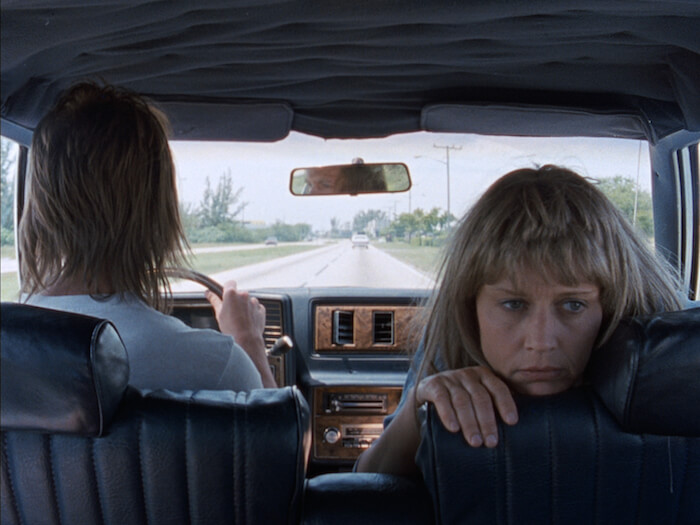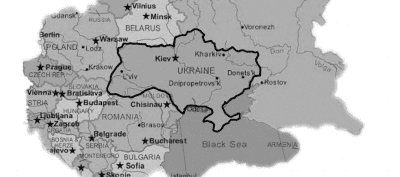River of Grass and the Unassuming Brilliance of Kelly Reichardt


Courtesy of Oscilloscope Laboratories
Kelly Reichardt’s debut feature River of Grass—nominated for the 1994 Sundance Grand Jury Prize and now restored and re-issued by Oscilloscope Laboratories; it opens Friday at the IFC Center—is so offhand in tone, fragmentary in structure, and coyly prosaic that some might mistake the film for a callow stumble or an arthouse trifle. In fact, it’s a work of casual and deceptive depth that re-imagines the 1950s Starkweather/Fugate thrill killings in Nebraska and Wyoming—coldly and elegiacally reconstituted in Terence Malick’s Badlands (1973)—as the washed-out reveries of two feckless, suggestible souls trying in vain to move beyond the eponymous stretch of listless highway that connects Miami and the Everglades.
Reichardt grew up in South Florida, and candidly admits (we spoke on the phone for this article) that the movie showed some “homegrown naïveté” and openly wore its cinematic influences. Nevertheless, with River of Grass the director inaugurated a signature naturalistic style—involving terse characters, fitfully in flux and unhurriedly observed, whose strife is often evoked by natural surroundings—that she has honed to a fine edge over the course of twenty years and six feature films. Like her melancholy road movie Wendy and Lucy (2008) and the audaciously contrary and anti-heroic revisionist western Meek’s Cutoff (2010), River of Grass presents unsettled people who seek to bolt their stultifying circumstances but lack the wherewithal to do so easily or safely. If some people in those circumstances do resort to crime as a way out, far more must merely imagine it in a manner that resembles Reichardt’s.
Wry, unostentatious humor invariably undergirds Reichardt’s depiction of the gap between capability and desire, and the often preposterously random way it yields upheaval and frustration. In River of Grass, an incompetent detective (recalling the languid Florida loucheness of films like Body Heat and Miami Blues) keeps heedlessly losing his gun. A layabout named Lee who lives with his mother finds the piece and brandishes it to impress Cozy, a restless housewife—and, coincidentally, the detective’s daughter—whom Lee picks up in a roadside bar on the pretext of having nearly run her over. They move on to drunkenly cavorting in a stranger’s swimming pool, inadvertently firing at him and becoming fugitives. But they don’t have the cruel hearts for a crime spree—their only other target is a palmetto bug at a fleabag motel—and their romantic escape founders when they run out of cash and can’t pay the toll to get on the open road.


Courtesy of Oscilloscope Laboratories
Nearly as frequently, there is subdued tragedy in Reichardt’s work. In Wendy and Lucy, set in the Pacific Northwest, Michelle Williams’s hapless Wendy must give up her dog (Lucy) to make her way, if only back to hardship. The pioneers in Meek’s Cutoff, manifestly destined for greener pastures or so they might think, may or may not perish on account of their gullible trust in a fraudulent guide. What’s so arresting about the film is that Reichardt leaves the viewer heartrendingly uncertain about their fate, as the pioneers themselves would have been as they “fought their own limits.” The sadness in River of Grass is less explicit but just as ingrained. Towards the end of the film, Cozy, who provides the movie’s plangently forlorn voice-over, intones: “It’s funny how a person can leave everything behind and still wind up in such a familiar place.” (That’s a lot more substantive than “Life is like a box of chocolates”—a more famous and roughly contemporaneous cinematic tagline.) As Cozy had perhaps intuited all along, her only sure remedy is an abrupt, impetuous act of casual violence. It’s a credit to Reichardt that this ugly event follows from the idiomatic logic of the story. And it’s discomfiting that it does not scan as merely senseless.
Reichardt stresses that she is not a “message” filmmaker, and does not self-consciously build motifs into her movies or try to tie them together by design. Instead, she is cued by compelling “scenes, places, and situations,” teasing them out and giving them narrative shape in a script (usually with co-writer Jonathan Raymond). Making a movie for her is an organic process, and not an analytic activity. But thematic patterns do emerge, and she acknowledges that she may “draw from a similar well” for each movie. If there is a general theme that could be distilled from Reichardt’s movies, it might be stasis—or what she calls “being stuck.” Her main characters tend to apprehend this as part of life, but they are loath to accept their restraints. However, Reichardt does not subscribe to can-do American optimism as any kind of psychological panacea. “I don’t buy into the idea that you can pull yourself up by your bootstraps and all you need is a good attitude. I don’t think things are really structured that way. There’s a lot in place to keep people in the rankings they are born into—both from society and from their own psyches,” she says.
To slip those bonds, the characters in the three movies already mentioned take vaguely hopeful or idealistic risks. In Old Joy (2006), her second feature and an indie classic, Reichardt reverses the focus, zoning in on the luminous, fleeting limbo of adolescence and the grim reality that it defies capture or preservation through arrested development and inevitably succumbs to the dutiful compulsion to grow up and face the world. Even so, Will Oldham’s Kurt can’t bring himself to move on. Reichardt’s most recently released film Night Moves (2013), with an archly non-verbal Jesse Eisenberg, involves those so disturbed by the status quo and their own mainstream inability to change it that they vault to environmental terrorism. Like Meek’s Cutoff, the movie tackles the dynamics and hierarchies of small groups. Steadfastly neutral in narrative point of view, the film also explores how typical players in an underground organization—the smoldering true believer, the blue-blood idealist, the cynical professional—break when protest becomes lethal. In a way, the film circles back to River of Grass: both movies are fundamentally about marginalized people whose motivations are worth considering—especially because the change they effect takes the form of irreversible transgression. (Her next film, Certain Women, based on Maile Meloy’s short stories, links the lives of three independently-minded Montana women at odds with the staid culture of the American west. It screened well at Sundance and should be released this year.)
Reichardt has now seen success, but she remains uncertain whether her brand of personal filmmaking will garner substantial support down the road, since in her movies “nothing’s exploding and there’s not a clear right or wrong.” The undeniable bias against women in film is also an ongoing challenge. “Every movie feels like the last one I’ll ever get to make,” she says. That would be a shame. Fortunately, it’s also unlikely. Her movies, from River of Grass to Night Moves, are not mere idiosyncratic curiosities. Reichardt’s preoccupations are emphatically, though not exclusively, American ones: ennui in the land of sunshine; the juvenility-responsibility tradeoff; the monetary cost of freedom; the obdurate reality of westward expansion; the prohibitive cost of true radicalism and criminality. (Certain Women may add post-feminist struggle to the list.) She nests these concerns in an unobtrusive, tacit existentialism whereby people keep making the same missteps because they are, irreducibly and inexorably, human and quietly desperate. As mordantly Beckettian as that may sound, it marks Reichardt as an artist of her time. This unassumingly brilliant filmmaker illuminates the sense and flavor of this disconsolate epoch in all its unheroic vexation.
You might also like 




















